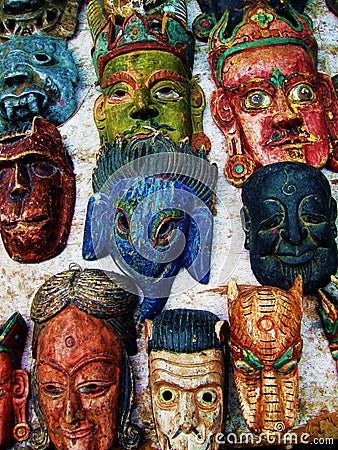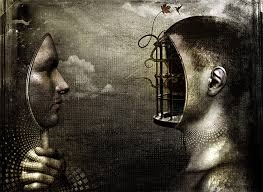Welcome home! Please contact lincoln@icrontic.com if you have any difficulty logging in or using the site. New registrations must be manually approved which may take several days. Can't log in? Try clearing your browser's cookies.
Masks of The Buddhas
 lobster
lobsterPureland Veteran
lobster
lobsterPureland Veteran

We all wear different hats or masks when dealing with different people situations, apart perhaps for Diogenes ...
https://en.m.wikipedia.org/wiki/Diogenes
Examining our behaviour, we find it changes according to company, age, influence etc.
In Tantric Buddhism the qualities or masks of the Buddha are temporarily worn for wisdom, healing, protection and so on.
Wot you presently wearing? (zenniths need not reply - not that fashion statements ever stopped their habits ...)
2


Comments
Skin, a mask for all occasions. Being serious.
I find the better my practice, the more absent the mask.
Inqusitive. Its good they are masks. We can have different genuine attributes without attaching and indentifying the masks as ourselves.
It's all part of the fun (of life) - one from a favorite movie ~
This topic reminds me of one of my pre-Buddhist musings. First, multiple times I’d been told to just be myself. Always an insult. “I am being myself.” Second, my dad once told me he wore his work face at work. It wasn’t just at work. Now he does different work and his "face", for the better, doesn’t much change on or off the clock. Lastly, I’d often heard people tell a personal story, then say of their behavior “but that’s not me.”
I’ve always been hard on myself. “We are our own worst critic.” So, reflecting on these, I had had to call BS. There’s no other real you. What you’re doing right now is you. It’s not somebody else; it’s you. I had began reading about Buddhism in adolescence, so it may have informed this view. It’s a relativist one. Whether or not it comports with right view, I definitely carried it in with me. I wear no masks. Whoever, whatever am I at any moment, for better or worse, that’s the real me.
And that reminds me of a man with many faces. Never could put a finger on that one.
When I realized how often this happened for me, I started to un-do it. Still a work in progress, but much better than I used to be. The worst part was not knowing who I was without all the masks I wore. Meditation and writing have helped me figure it out. The more I figure out, the less there is to talk about. The more I understand, the less I need labels or their masks. But the world sure likes the masks!
Thanks everyone.
Yesterday I spoke and behaved in a different way to several people. A child, a person recovering from a breakdown, someone suffering from the confusion of alzeimers, a friend.
The friend does not require a mask. The child is trying out different persona/masks. Someone trying to return to conventional reality and somone confused and fragile is not not open to unfiltered behavour.
So in this sense responses may be real but also social/compassionate masks.
In a similar way in Tantra, components of the unmasked/genuine/Buddha Nature qualities may be worn during a sadhana (practice) ...
http://welcomingbuddhist.org/archives/category/sadhana
Is every different response we have really a mask though? To me, a mask insinuates hiding behind something. We might respond one way if we were operating from our true nature, but because we aren't comfortable to do so, we hide behind something we really aren't. I respond differently in differently situations depending who is involved. But I've noticed a definite difference when I am wearing a mask, pretending to be someone I am not rather than when I am using my heart and compassion to determine the best way to proceed based on what that person might need at the time. I think they are very different.
One moment...I'll just take a look...

I tend to go with the flow of changing circumstances/situations..And so the mask that I wear is a flexible one. an emotion detector of sorts which picks up on other energies in motion and adapts accordingly, however the framework it covers remains in a constant state of calm awareness...(Well for most part it does) ....
So I'm presently wearing my usual one....
I have to be honest and say that WYSIWYG, with me, 99% of the time. The only time I can honestly, hand on heart, say I wear a mask, is when people are telling me their problems; I guess it harks back to the days I as in Counsellor training;
"You must at all times appear imperturbable and unshockable. Whatever your own immediate impulse, or growing opinion of the person confiding in you, it is imperative you appear empathetic and neutral."
If someone trusts me enough to tell me their most personal secrets, the least I can do is to respect their candid outpourings and not be judgemental....
My late mentor used to say that over the years, she had become completely unshockable; the only times she openly displayed her utter disappointment was when two people, who had apparently once been so in love, that they wanted to pledge their lives to one another 'until death doth us part' became hostile and disrespectful towards one another.
I oftentimes came to see what she meant.
looking at my face in the mirror,might remind me how we take care of ourselves affect rate of change in our features.lately looking at face in the mirror just as is.might be dharma practice of seeing change.
“One evening Milarepa returned to his cave after gathering firewood, only to find it filled with demons. They were cooking his food, reading his books, sleeping in his bed. They had taken over the joint. He knew about nonduality of self and other, but he still didn’t quite know how to get these guys out of his cave. Even though he had the sense that they were just a projection of his own mind—all the unwanted parts of himself—he didn’t know how to get rid of them. So first he taught them the dharma. He sat on this seat that was higher than they were and said things to them about how we are all one. He talked about compassion and shunyata and how poison is medicine. Nothing happened. The demons were still there. Then he lost his patience and got angry and ran at them. They just laughed at him. Finally, he gave up and just sat down on the floor, saying, “I’m not going away and it looks like you’re not either, so let’s just live here together.” At that point, all of them left except one. Milarepa said, “Oh, this one is particularly vicious.” (We all know that one. Sometimes we have lots of them like that. Sometimes we feel that’s all we’ve got.) He didn’t know what to do, so he surrendered himself even further. He walked over and put himself right into the mouth of the demon and said, “Just eat me up if you want to.” Then that demon left too.”
~Pema Chödrön, Start Where You Are: A Guide to Compassionate Living